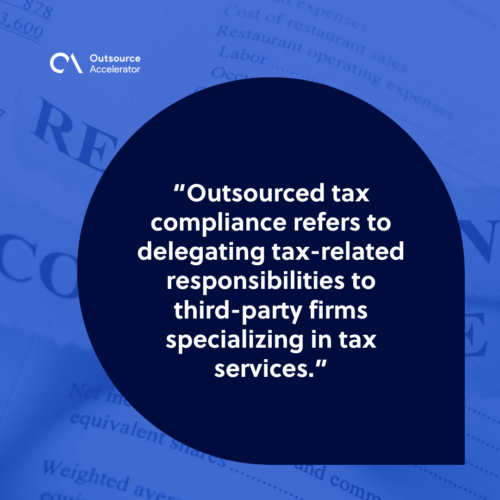Outsourced tax compliance: Simplify your business processes

An essential component of managing a business is tax compliance. It can often be time-consuming and complex – but it is necessary.
However, for many organizations, outsourced tax compliance has become a game-changer. By entrusting tax-related tasks to experts, they are able to focus on their core operations while ensuring accuracy and compliance with regulations.
In this article, we explore what outsourced tax compliance entails, its benefits, how to determine if it’s the right choice for your business, and how to select the best service provider.
Outsourced tax compliance explained
Outsourced tax compliance refers to delegating tax-related responsibilities to third-party firms specializing in tax services. These providers handle a variety of tax-related services, including but not limited to:
- Tax preparation
- Tax filing
- Reporting audits
- Ensuring that your business complies with domestic and foreign tax laws
Companies gain access to a team of tax experts who stay up-to-date on ever-changing regulations through outsourcing. This is especially valuable for businesses operating across multiple jurisdictions where tax laws can vary significantly.

5 Benefits of outsourcing tax compliance
It might seem like a risky choice to outsource anything related to tax and finances, but why are more and more businesses doing it?
Here are five key benefits of outsourced tax compliance. If you’re doubting this strategy, these advantages may help change your mind!
1. Accuracy and expertise
Tax regulations are complex and subject to frequent updates. By outsourcing, businesses can rely on specialists who understand the nuances and ensure compliance, reducing the risk of errors and penalties.
2. Cost efficiency
Maintaining an in-house tax team can be expensive, particularly when factoring in salaries, benefits, and training. Outsourced tax compliance is often more cost-effective, as businesses pay only for the services they need.
In addition, hiring offshore full-time tax professionals can help you save up to 60% on overhead costs without compromising the quality of work provided.
3. Access to advanced tools
Many outsourced providers use cutting-edge software and tools that improve accuracy and efficiency. These are often at a fraction of the cost it would take for a business to implement these solutions independently.
4. Scalability
As your business grows, your tax compliance needs may become more complex. Outsourced providers can scale their services to meet these evolving requirements.
A common tip for outsourcing beginners is to start with one or two employees, then add more team members when needed. If you’re just starting with outsourcing, this can be a good strategy to try.
5. Stress reduction
Knowing that experts are handling your taxes can significantly reduce the anxiety often associated with meeting deadlines and navigating audits.
Is outsourced tax compliance right for your business?
Outsourced tax compliance can benefit a wide range of businesses, but it may not be the right fit for everyone.
Consider the following factors to determine if it’s the best solution for your company:
- Internal expertise. If your in-house team lacks the specialized knowledge to handle complex tax scenarios, outsourcing tax compliance can bridge the gap.
- Cost-benefit analysis. Evaluate the cost of outsourcing tax compliance against the expenses of maintaining an in-house team. Determine if the potential savings and added benefits justify making the switch to an outsourced solution.
- Seasonal workload. Businesses with fluctuating tax needs—such as those with seasonal operations or occasional audits—may find outsourcing more efficient than maintaining a full-time in-house team.
- Growth and expansion plans. If your business is expanding into new markets or jurisdictions, outsourced providers can help navigate unfamiliar tax laws and requirements to ensure a smooth transition.

Choosing the best outsourced tax compliance services provider
Finding the right outsourced tax compliance provider is essential for maximizing the benefits of outsourcing.
Here are key considerations to guide your decision:
Proven expertise and credentials
Partner with providers who have a strong track record in tax compliance and industry-specific expertise. Verify their certifications and ability to handle complex tax scenarios.
Advanced tools and technology
Technology can enhance transparency and streamline the process. Ensure that the provider uses secure, state-of-the-art tools for accurate and efficient tax management.
Reputation and client feedback
Look for testimonials or client references to confirm the provider’s reliability and service quality. A strong reputation is a sign of consistent and impressive performance.
Cost transparency
Understand the provider’s pricing structure and confirm that it aligns with your budget. Look for providers who offer clear and upfront cost breakdowns, avoiding hidden fees.
Final thoughts on the role of outsourced tax compliance in modern business solutions
The decision to outsource tax compliance can yield substantial benefits for businesses, offering cost-effectiveness, specialized expertise, and enhanced regulatory compliance. Evaluating and selecting a reputable provider allows you to streamline your tax processes and focus on core operations.
Implementing clear communication, robust monitoring, and flexible scalability are vital for successful integration of outsourced tax compliance.
Real-world case studies underscore the tangible impact of this practice, while proactive strategies can effectively address potential challenges.
The future of outsourced tax compliance will continue to evolve, solidifying its position as a strategic asset in modern business operations.







 Independent
Independent




